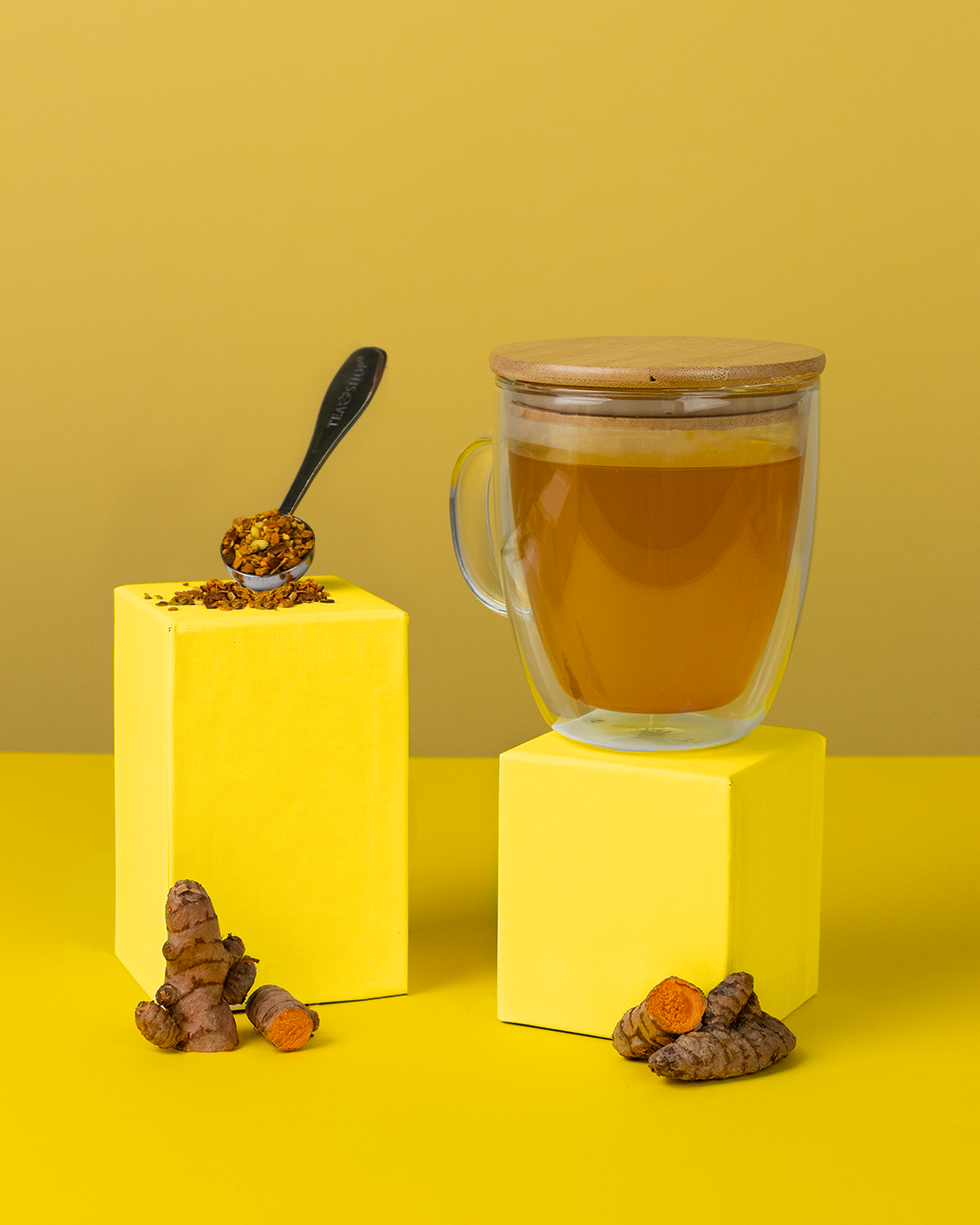
Anti inflammatory teas: how plants can help
Back pain, sensitive joints, muscle pain, cramps, period pain, abdominal pain …
Before resorting to potent anti-inflammatory drugs which may have adverse side effects, especially on the stomach lining (that’s why gastric protectors are so often prescribed along with anti-inflammatory medication), there is a natural alternative to painkillers: anti-inflammatory herbal teas based on medicinal plants.
Let’s see which plants may be a great help if you are looking for a natural anti-inflammatory remedy.
Anti-inflammatory teas: some anti-inflammatory herbs and spices that will help
- Turmeric (Curcuma) tea
Turmeric is currently one of the most commonly used and recommended plants to prevent and relieve joint pain.
Turmeric has been used in traditional Chinese and Ayurvedic medicine for thousands of years, as one of its compounds, curcumin (a poliphenolic pigment) has powerful antioxidant and anti-inflammatory properties, and is particularly effective at treating joint pain and muscle injuries due to intense physical activity or exercise-induced muscle damage.
Likewise, turmeric is recommended in case of such inflammatory conditions as arthrosis (wear and tear on joints and cartilage) and rheumatoid arthritis.
Some studies have also shown that turmeric can help reduce intestinal inflammation, gastritis and pancreatitis, and relieve pain related to ulcerative colitis.
In Tea Shop you can enjoy the benefits of turmeric in our Red Tea Pu Erh Curcuma Latte, an exquisite tea blend made with Pu Erh, well known for its digestive and cleansing properties, turmeric and ginger.
You can also prepare a soothing and comforting tea with our Herbal Tea Super Turmeric, a delicious drink mix.

- Ginger tea
High in vitamins and minerals, antioxidant, antiviral, antibacterial … ginger, the root of a thousand virtues, is another powerful anti-inflammatory natural remedy.
It especially helps to reduce symptoms of colds, flu, and sore throat (pharyngitis), and to relieve aches and pains caused by fever.
Ginger also helps lessen joint pain, overuse injuries, or rheumatic affections.
The main compound of ginger, gingerol, has anti-inflammatory and antioxidant properties, and is very effective at relieving digestive discomfort as well as stomach spasms and bloating.
It also has a gastro-protective effect.
You can enjoy the benefits of ginger in our selection of Chai Teas, or relish its intense and amazing flavour with our Ginger Balm herbal tea.
- Cardamom tea
Cardamom belongs to the same botanical family as ginger and turmeric (curcuma).
It is another medicinal plant traditionally used in Chinese and Ayurvedic medicine.
Anti-inflammatory, antispasmodic and analgesic, it is particularly recommended when treating inflammation of the digestive tract, indigestions, colic, gastritis and diarrhea.
Due to its anti-inflammatory properties, cardamom is also used to relieve cough and treat affections of the respiratory system, such as bronchitis - in India, cardamom is traditionally used to treat colds.
A natural antispasmodic, cardamom also helps fight muscular pain and menstrual cramps (period pain).
You can find cardamom associated with ginger (another potent anti-inflammatory plant) in our flavourful Indian Yogi, a delicious herbal tea with cinnamon notes, as well as in our range of Chai Teas.
- Rosemary tea
Rosemary is antispasmodic and anti-inflammatory, and is commonly used to relieve digestive conditions and stomachache (slow digestion, abdominal bloating and gases, stomach and intestinal spasms and colic).
Studies also showed that rosemary helps lessen pain in such conditions as arthrosis and arthritis.
Antiseptic and antibacterial, rosemary tea helps reduce inflammation of the respiratory system (bronchitis, pharyngitis), soothes a sore throat and relieves cough.
Enjoy the benefits of rosemary with a hot cup of our Mediterraneo herbal tea, a refreshing, aromatic and citrus-flavoured drink!
- Licorice tea
Licorice is particularly effective at relieving inflammation of the digestive and respiratory tract.
Most of us have certainly relied on a licorice lozenge or tablet to relieve a sore throat, reduce laryngitis or cold symptoms … or simply clear our throat, heal our voice and prevent hoarseness!
Licorice tea is also recommended for joint inflammation and rheumatism.
Enjoy the properties of licorice root in our Herbal Spirit herbal tea (with a hint of mint) or associated with some Chai spices (ginger, cardamom…) in our Indian Secret herbal tea, or in our incredibly tasty Black Tea Chai Latte ... just perfect to make an authentic Chai Latte!

- Chamomile tea
"Multi-faceted" chamomile may be a great help in case of inflammatory pain.
Traditionnally used to lessen period pain, chamomile tea is also effective at treating inflammation of the digestive tract (gastritis, oesophagus, ulcers) and dyspepsia (the feeling of being too full after or during a meal, which may include nausea, bloating and heartburn).
On the other hand, chamomile tea helps reduce inflammation and irritation of the respiratory tract, which is very beneficial in case of cold and flu.
Try a cup of our sweet and soothing Camomilla Golden!
- Lemon verbena tea
Lemon verbena has anti-inflammatory properties similar to aspirin, due to its content of prostaglandins, the substances that are involved in dealing with healing.
This plant is commonly used in case of joint pain and rheumatism, arthrosis and arthritis, and also helps to relieve pain caused by injury and physical trauma, as well as to reduce inflammation of the digestive tract.
Try our relaxing, digestive and tasty Dreaming Verveine!
As a preventive measure or for occasional pain relief, an anti-inflammatory tea is a wonderful natural option to take care of yourself.
However, if symptoms persist or worsen and if pain becomes chronic, consult your physician for personalized medical advice.
All medicinal plants have active compounds that may interact with drugs and reduce or enhance their effects, or affect specific health conditions or chronic diseases. You should always consult with your doctor before consuming plants if you take drugs or supplements.



2 comments
Muy buena información,ac en Uruguay se consigue, gracias.
Nora
Gracias por la información
Andrés Cruz
Leave a comment
This site is protected by hCaptcha and the hCaptcha Privacy Policy and Terms of Service apply.